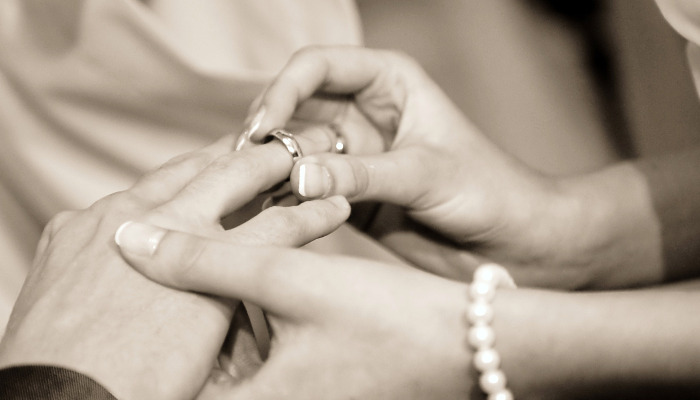
The sacrament of marriage is one of the most contested, commented on and discussed elements of church life. At its heart is that two people pledge to love one another exclusively until they die. Controversies surround which people should be able to do this to one another and what the limits of the sacrament are if the covenant between the two people becomes broken but it is important not to lose sight of the idea that the committed love between two people is seen by the church as speaking not only of the couple themselves but of God’s love for the world.
Marriage is not only regarded as something that is sacramental. Nowadays it is also a very clearly defined legal status which is regulated by civil authority. The civil regulation surrounding marriage has increased and changed over the years. At this point in history, people are only regarded as legally married if they have gone through a legal ceremony which can take place either in front of a registrar or in front of a religious celebrant. At one time in Scotland a couple (made up of a man and a woman) could claim to be legally married if they could prove that they were generally regarded as being a married couple by society. The days of so-called “habit and repute” marriages are now over and anyone wanting to marry must do so formally.
Marriage is unusual amongst the sacraments in being one in which the priest who presides over the marriage is not in fact the minister of the sacrament. Instead, the couple themselves are regarded as the celebrants of the sacrament one to another, the priest being merely the one responsible for ensuring that everything is in order and acting as the chief amongst those witnessing the event. A cleric marrying two people has the joy of declaring to the assembled company that the couple are in fact married. Sometimes the sacramental nature of this is acted out by binding the couple’s hands together using the stole, the scarf like garment that a priest wears.
Other outward signs and symbols of what is happening include the exchange of promises, the vow made between the two people and the exchange of rings which might be blessed by the priest.
The current controversies over marriage are mostly about whether or not same-sex couples should be able to get married in church. In Scotland a same-sex couple can currently marry in the eyes of the law but not in a Scottish Episcopal Church. This matter will come before the General Synod in June 2017 and it is possible that the situation may change then.
However, it should not be presumed that issues surrounding same-sex couples are the only way in which marriage has changed. Perhaps more fundamental is the way that the marriage service now presumes the couple coming to be married to be equals. At one time the marriage service effectively saw what was going on as a transaction in which the woman was handed over from her father to her new husband rather like a piece of property. This can still be seen in the way that some people chose to enter a church for a marriage, the woman coming down the aisle on her father’s arm. Such things are not part of the rites of the church and there are other ways of entering which some couples chose. For example, some couples who are already living together may prefer to come down the aisle with one another and together with any children that they might have. The equality of the two people getting married is a distinctive feature of the modern marriage service which the church uses. Another feature of this service is that the couple themselves get to choose many of the things which happen, carefully constructing a service which represents who they are. There are no “off the shelf” marriage services in the Scottish Episcopal Church.
Marriage ceremonies can be very simple or very spectacular. They are always moving occasions because people bring their greatest aspirations together and hope not only for the best for one another but declare that they will offer the best of themselves to the other partner.
Marriages are regarded as sacramental because the outward signs of living together in a loving exclusive partnership speak of the love that God has for us. This isn’t a new idea, it is one that has been around since biblical times. It is important to remember that it is marriage which is thought of as a sacrament, not a wedding service. Weddings are wonderful but the thing which reminds us of God is passionate, self-giving, committed, exclusive, joyful love.
Frequently Asked Questions
Are you more married if you get married in Church than in a Registry Office?
No
I’ve been married before, can I still get married in Church?
The Scottish Episcopal Church marries a lot of people who are doing this for the second time around. The clergy can agree to marry people in that situation with their bishop’s permission. The important thing to do is to talk to one of the clergy about this. Clergy at St Mary’s will not agree to perform a marriage or bless a civil partnership if doing so would lead to a scandal – for example, if you have children from a previous relationship whom you are not supporting financially.
